|
|
 |
Fiche d'espèce de Copépode |
|
|
Calanoida ( Ordre ) |
|
|
|
Arietelloidea ( Superfamille ) |
|
|
|
Heterorhabdidae ( Famille ) |
|
|
|
Heterostylites ( Genre ) |
|
|
| |
Heterostylites longicornis (Giesbrecht, 1889) (F,M) | |
| | | | | | | Syn.: | Heterochäta longicornis Giesbrecht,1889; 1892 (p.373, 383, 773, Descr.F, figs.F);
Heterorhabdus longicornis : Giesbrecht & Schmeil, 1898 (p.116, Rem. F); Wolfenden, 1904 (p.124, fig.M); Esterly, 1905 (p.186, figs.M, Rem.F,M); 1906 a (p.77, fig.F); Pearson, 1906 (p.26); van Breemen, 1908 a (p.125); Farran, 1905 (p.45); 1908 b (p.67, Rem.); A. Scott, 1909 (p.131, Rem.); Wolfenden, 1911 (p.302); Farran, 1926 (p.283); Sewell, 1932 (p.301, Rem.); Wilson, 1932 a (p.134, figs.F,M); 1936 c (p.92); Oliveira, 1945 (p.191); Sewell, 1948 (p.503); Greze & al., 1985 (p.8); Lapernat, 2000 (tab.3); in CalCOFI regional list (MDO, Nov. 2013; M. Ohman, comm. pers.);
Heterochaeta zetesios Wolfenden, 1902 (p.367, Descr.M); Fowler, 1903 (p.124) | | | | Ref.: | | | Sars, 1925 (p.238, figs.F,M); ? Farran, 1929 (p.209, 267); Sewell, 1932 (p.301, figs.F); Rose, 1933 a (p.207, figs.F,M); Jespersen, 1940 (p.55); Lysholm & al., 1945 (p.36); Sewell, 1947 (p.181); Farran, 1948 d (n°15, p.3, figsF,M); Davis, 1949 (p.60, figs.F,M); C.B. Wilson, 1950 (p.241); Brodsky, 1950 (1967) (p.358, Rem.F,M); Vervoort, 1957 (p.135, Rem.); Tanaka, 1964 a (p.23, figs.F); Vervoort, 1965 (p.122, Rem.); Owre & Foyo, 1967 (p.80, figs.F,M); Park, 1968 (p.561, Rem.); Bradford, 1970 a (p.359, figs.F,M); Gardner & Szabo, 1982 (p.378, figs.F,M); Roe, 1984 (p.358); Ali-Khan 1993 (p.120, figs.F,M); Razouls, 1994 (p.166, figs.F,M); Chihara & Murano, 1997 (p.817, Pl.117: F,M); Bradford-Grieve & al., 1999 (p.883, 945, figs.F,M); Bradford-Grieve,1999 b (p.81, figs.F,M, Rem., figs.176, 191); Park, 2000 (p.45, figs.F,M, Rem.); Vives & Shmeleva, 2007 (p.314, figs.F,M, Rem.) | 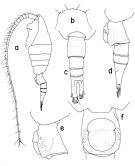 issued from : T. Park in Bull. Scripps Inst. Oceanogr. Univ. California, San Diego, 2000, 31. [p.176, Fig.24]. Female: a, habitus (left side); b, forehead (dorsal); c, d, urosome (dorsal, left, respectively); e, f, genital somite (left, ventral, respectively).
|
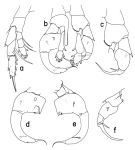 issued from : T. Park in Bull. Scripps Inst. Oceanogr. Univ. California, San Diego, 2000, 31. [p.177, Fig.25]. Female: a, P5 (anterior). Male: b, P5 (anterior); c, left P5 (with distal endopodal segments omitted), anterior; d, e, exopod of right P5 (anterior, postrior, respectively);f, exopod of left P5 (posterior).
|
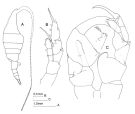 issued from : J.M. Bradford-Grieve in The Marine Fauna of New Zealand: Pelagic Calanoid Copepoda. National Institute of Water and Atmospheric Research (NIWA). NIWA Biodiversity Memoir, 111, 1999. [p90, Fig.57]. Female: A, habitus (right lateral side); B, P5. Male: C, P5.
|
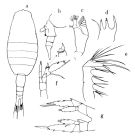 issued from : O. Tanaka in Publs Seto Mar. Biol. Lab., 1964, XII (1). [p.24, Fig.185]. Female: a, habitus (dorsal); b, last thoracic segment and urosome (lateral left side); c, Md (mandibular palp); d, Md (biting edge); e, Mx2; f, P5. Nota: The urosome segments and furca are in the proportional lengths as 38:16:13:11:22 (right) = 100; A1 over-reaches the furca by 7 terminal segments. Immature male: g, P5.
|
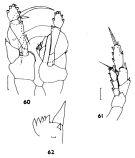 issued from : J.M. Bradford in N.Z. Jl Mar. Freshw. Res., 1970, 4 (4). [p.360, Figs 60-62]. Female (off Kaikoura, New Zealand): 61, P5; 62, distal part of 2nd exopod of P5. Male: 60, P5. Scale bars represent 0.1 mm.
|
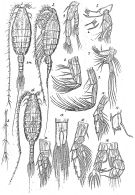 issued from : G.O. Sars in Résult. Camp. scient. Prince Albert Ier, Monaco, 1924. [Pl. LXVII, figs.1-16]. Female (from around Azores Islands & Bay of Biscay): 1, habitus (dorsal view); 2, idem (lateral view from left side); 3, left A1); 4, A2; 5, Md; 6, cutting edge of the manducatory plate; 7, Mx1; 8, Mx2; 9, Mxp.; 10, P1; 11, P3; 12, P5; 13, exopodite 2 of P5; 14, anal segment and furca. Npta: A1 24-segmented, exceeding about 1/4 body length. Male: 15, habitus (dorsal view); 16, P5. Nota: Nota: compare the four last segments of A1 with H. major ones.
|
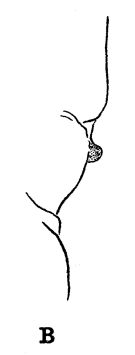 issued from : R.B.S. Sewell in The John Murray Expedition, 1933-34, Scientific Reports, VIII (1), 1947. [p.166, Fig.44, B]. Process on the posterior aspect of the 2nd basal segment of P1. Remarks: The shape of the hook-like or spine-like process shows some variation in different genera, but it is undoubtedly homologous throughout the whole series. The function of this organ is unknown.
|
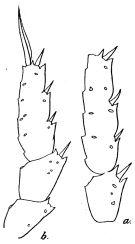 Issued from : R.B.S. Sewell in Mem. Indian Mus., 1932, X (continued). [p.301, Fig.98, a-b]. Female (from N Indian): a, exopod of P2; b, exopod of P3.
|
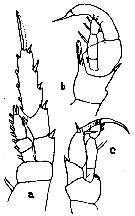 issued from : C.O. Esterly in Univ. Calif. Publs. Zool., 1905, 2 (4). [p.186, Fig.40]; As Heterorhabdus longicornis. Male (from San Diego Region): a, P3; b, right P5; c, left P5.
|
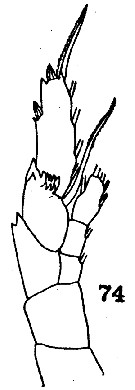 issued from : C.O. Esterly in Univ. Calif. Publs Zool., 1906, 3 (5). [Pl.13, Fig.74]. As Heterorhabdus longicornis). Female (from San Diego, California): 74, P5.
|
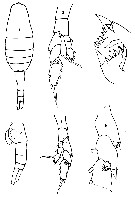 issued from : S. Ali-Khan in Crustaceana, 1993, 65 (1). [p;121, Figs.1-6]. Female (from 24°09'N, 64°27'E): 1, habitus (dorsal); 2, urosome (lateral); 3, P5; 4, part of exopodite of P5 (enlarged); 5, P5 (from another specimen); 6, part of exopodite of P5 (enlarged; same specimen). Nota: The female specimens agree in general with the previously descriptions. Exceptions noted include the left caudal ramus (4 times as long as wide), the 2nd basipodal segment of P5 (without any seta or spine), the 2nd exopodal segment of P5 (with a crown of 7 teeth), and the P5 of another specimen (atypical by having 3 extra teeth on the 1st exopodal segment).
|
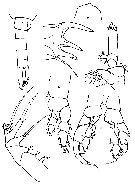 issued from : S. Ali-Khan in Crustaceana, 1993, 65 (1). [p;122, Figs.7-13]. Male (from 24°09'N, 64°27'E): 7, 5th thoracic somite and urosome (dorsal); 8, forehead (dorsal); 9, Md (biting edge); 10, Mx1; 11, Mx2; 12, P1; 13, P5.
|
 Issued from : W. Giesbrecht in Systematik und Faunistik der Pelagischen Copepoden des Golfes von Neapel und der angrenzenden Meeres-Abschnitte. – Fauna Flora Golf. Neapel, 1892. Atlas von 54 Tafeln. [Taf. 39 , Fig.44 ]. As Heterochäta longicornis. Female: 44, habitus (dorsal).
|
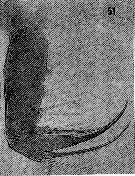 issued from : H.B. Owre & M. Foyo in Fauna Caribaea, 1, Crustacea, 1: Copepoda. Copepods of the Florida Current. 1967. [p.17, Fig.51]. Female: 51, Mx2.
|
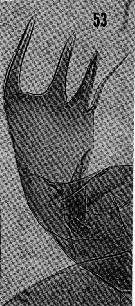 issued from : H.B. Owre & M. Foyo in Fauna Caribaea, 1, Crustacea, 1: Copepoda. Copepods of the Florida Current. 1967. [p.17, Fig.53]. Female: 53, Md (gnathobase).
|
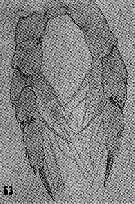 issued from : H.B. Owre & M. Foyo in Fauna Caribaea, 1, Crustacea, 1: Copepoda. Copepods of the Florida Current. 1967. [p.19, Fig.63]. Female: 63, P5.
|
 Issued from : W. Giesbrecht in Systematik und Faunistik der Pelagischen Copepoden des Golfes von Neapel und der angrenzenden Meeres-Abschnitte. - Fauna Flora Golf. Neapel, 1892. Atlas von 54 Tafeln. [Taf. 20 , Figs.14, 21 ]. As Heterochäta longicornis. Female: 14, Mx2 (posterior view); 21, Basipodites 1 and 2 of Mxp (anterior view).
|
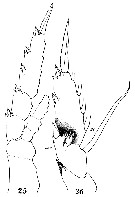 Issued from : W. Giesbrecht in Systematik und Faunistik der Pelagischen Copepoden des Golfes von Neapel und der angrenzenden Meeres-Abschnitte. - Fauna Flora Golf. Neapel, 1892. Atlas von 54 Tafeln. [Taf. 20 , Figs.25, 26 ]. As Heterochäta longicornis. Female: 25, P3 (posterior view); 26, exopod of P5 (anterior view).
|
 Heterostylites longicornis Heterostylites longicornis female: 1 - Dorsally, genital somite widest at middle. 2 - Ventrally, genital operculum much wider than 1/2 width of somite (Fig.24-f).
|
 Heterostylites longicornis Heterostylites longicornis male: 1 - Basal lobe of right P5 long (Fig.25-b); basal lobe of left P5 relatively long and rounded. 2 - Basal lobe of left P5 relatively small (Fig.25-c).
|
 Issued from : W. Giesbrecht in Systematik und Faunistik der Pelagischen Copepoden des Golfes von Neapel und der angrenzenden Meeres-Abschnitte. – Fauna Flora Golf. Neapel, 1892. Atlas von 54 Tafeln. [Taf.39, Fig.44]. As Heterochäta longicornis. Female: 44, habitus (dorsal).
|
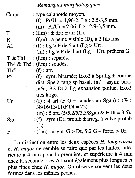 Issued from : C. Razouls in Ann. Inst. océanogr., Paris, 1994, 70 (1). [p.166]. Caractéristiques morphologiques de Heterostylites longicornis femelle et mâle adultes. Terminologie et abbréviations: voir à Calanus propinquus.
| | | | | Ref. compl.: | | | Wilson, 1942 a (p.190); Sewell, 1948 (p.329, 504, 514: Rem., 525, 532, 533, 547, 549, 558, 567); C.B. Wilson, 1950 (p.241); Fagetti, 1962 (p.31); Grice, 1963 a (p.496); Unterüberbacher, 1964 (p.30); De Decker & Mombeck, 1964 (p.12); Furuhashi, 1966 a (p.295, vertical distribution in Oyashio/Kuroshio transitional area, Table 7); Grice & Hulsemann, 1967 (p.18); Fleminger, 1967 a (tabl.1); Morris, 1970 (p.2301); Vinogradov, 1968 (1970) (p.277); Itoh, 1970 a (tab.1); Park, 1970 (p.477); Deevey, 1971 (p.224); Roe, 1972 (p.277, tabl.1, tabl.2); Björnberg, 1973 (p.346, 387); Deevey & Brooks, 1977 (p.256, tab.2, Station "S"); Carter, 1977 (1978) (p.36); Dessier, 1979 (p.206); Kovalev & Shmeleva, 1982 (p.84); Guangshan & Honglin, 1984 (p.118, tab.); Stephen, 1984 (p.161, 169, Distribution vs thermocline & geographic); Greze & al., 1985 (p.9); Brenning, 1985 a (p.28, Table 2); Rudyakov, 1986 (tab.1); Brinton & al., 1986 (p.228, Table 1); Brenning, 1986 (p.13, Rem.); Wiebe & al., 1988 (tab.7); Heinrich, 1990 (p.18); Suarez & al., 1990 (tab.2); Suarez & Gasca, 1991 (tab.2); Gowing & Wishner, 1992 (tab.1); Suarez, 1992 (App.1); Shih & Young, 1995 (p.70); Padmavati & al., 1998 (p.349); Suarez-Morales & Gasca, 1998 a (p.110); Razouls & al., 2000 (p.343, tab. 5, Appendix); Madhupratap & al., 2001 (figs.4, 5); Holmes, 2001 (p.16); Lo & al., 2004 (p.89, tab.1); Kazmi, 2004 (p.228); Prusova & Smith, 2005 (p.75); Lavaniegos & Jiménez-Pérez, 2006 (tab.2, 4, Rem.); Cabal & al., 2008 (289, Table 1); Gaard & al., 2008 (p.59, Table 1, N Mid-Atlantic Ridge); Galbraith, 2009 (pers. comm.); Schnack-Schiel & al., 2010 (p.2064, Table 2: E Atlantic subtropical/tropical); Swadling & al., 2010 (p.887, Table A1, abundance); Medellin-Mora & Navas S., 2010 (p.265, Tab. 2); in CalCOFI regional list (MDO, Nov. 2013; M. Ohman, comm. pers.); Williams R., 2013 (p.71, figs., Table 3.2, 3.4, 3.6, Appendix A, C; C & N composition, trophic level); Fierro Gonzalvez, 2014 (p.1, Tab. 3, 5, occurrence, abundance) | | | | NZ: | 22 | | |
|
Carte de distribution de Heterostylites longicornis par zones géographiques
|
| | | | | | | | | | | | | | | | | | | Loc: | | | Antarct. (Indian, Mc Murdo), sub-Antarct. (Indian), South Africa (E), Namibia, off St. Helena Is., off Ascension Is., Congo, G. of Guinea, off NW Cape Verde Is., Canary Is., Morocco, off Madeira, off Portugal, off W Cap Finisterre, Azores, off Amazon, off Orenoque, Barbada Is., Caribbean Sea, G. of Mexico, Caribbean, Florida, Sargasso Sea, off Bermuda: Station ‘’ S’’ (32°10’N, 64°30’W), Woods Hole, G. of Maine, S Iceland, Faroe Is., off Ireland (S & W), off W Scotland, North Sea, Bay of Biscay, Medit. (Alboran Sea, W Basin), G. of Oman, Arabian Sea, Pakistan, Natal, Indian, Bay of Bengal, Indonesia-Malaysia, China Seas (East China Sea, South China Sea), Taiwan (N: Mienhua Canyon), Japan (Izu), S Kuril Is., off British Columbia, Pacif. (central subtropical N-S), Guaymas Basin, San Diego, S California, Gulf of California, off W Mexico, Tehuantepc Bowl - Costa Rica Bowl, off Galapagos, off Peru, Pacif. (SE tropical), off Chile, Chile, Pacif. (W equatorial), E New Zealand, Tasman Sea | | | | N: | 85 | | | | Lg.: | | | (1) F: 3; (16) F: 2,7-2,3; M: 2,7; (17) F: 3,4; (22) F: 3,4-2,5; M: 3,5-3; (38) F: 3,5-2,94; M: 3,68-2,88; (45) F: 3-2,5; M: 3,25-3; (46) F: 3; (59) F: 4,3-3; M: 4,3-3; (72) F: 2,9-2,8; M: 2,9; (121) F: 3,05; (142) M: 3; (199) F: 2,89-2,58; M: 2,81; (313) F: 3,2-3,05; M: 3; (403) F: 3,2; M: 3,3; (432) F: 3,12-2,95; (824) F: 3,44-2,6; M: 3,4-2,56; (909) F: 2,9-3,4; M: 3,1; (1108) F: 2,9; {F: 2,30-4,30; M: 2,56-4,30} | | | | Rem.: | méso-bathypélagique.
Sampling depth (Antarct., sub-Antarct.) : 1000 m.
Seules les dimensions et la longueur relative des A1 permettent de discriminer cette espèce de Heterostylites major.
Pour Park (2000, p.46) certaines identifications sont mal assurées, d'où des localisatons douteuses.
Voir in remarques in Bradford-Grieve (1999 b, p.89)
Voir aussi les remarques en anglais | | | Dernière mise à jour : 17/06/2021 | |
|
|
 Toute utilisation de ce site pour une publication sera mentionnée avec la référence suivante : Toute utilisation de ce site pour une publication sera mentionnée avec la référence suivante :
Razouls C., Desreumaux N., Kouwenberg J. et de Bovée F., 2005-2026. - Biodiversité des Copépodes planctoniques marins (morphologie, répartition géographique et données biologiques). Sorbonne Université, CNRS. Disponible sur http://copepodes.obs-banyuls.fr [Accédé le 29 janvier 2026] © copyright 2005-2026 Sorbonne Université, CNRS
|
|
 |
 |























